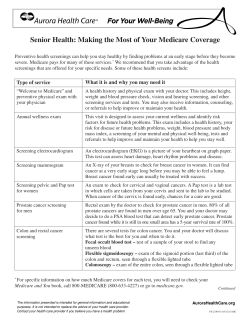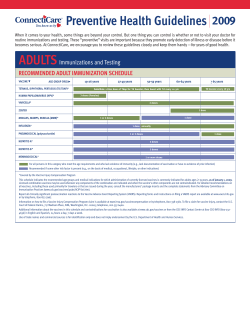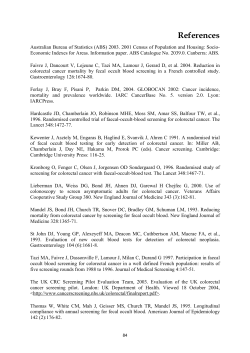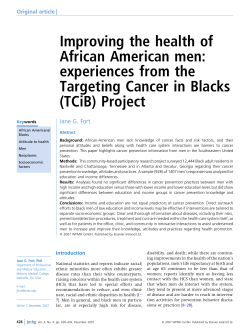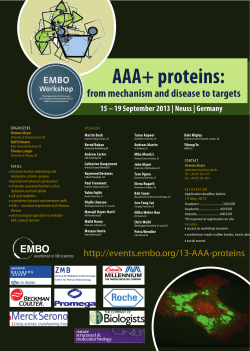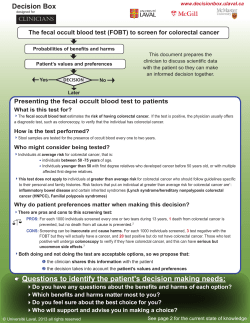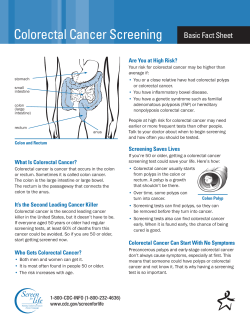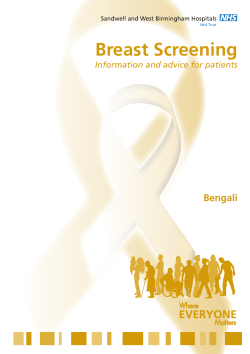
9.11 Screening Programmes for Older People
March 2012: Next Review September 2012 9.11 Screening Programmes for Older People Abdominal Aortic Aneurysm (AAA) Screening Men are invited for screening during the year (1st April to 31st March) when they have their 65th birthday. Men aged over 65 years can self refer. Trafford figures for men invited in 2010/11, (men born from 1st April 1945 to 31st March 1946), are as follows: • 1062 men in the cohort • 981 invited for screening, (92.4% of the cohort) • 798 attended, (coverage is 75.1% of the cohort, uptake is 81.3% of those invited) • 759 had normal results, (95.1% of those attending – no further screening required) • 37 had small aneurysms (4.64% of those attending – further surveillance within the screening programme required at either yearly or 3 monthly intervals) • 2 had large aneurysms (0.25% of those attending – referred to a Consultant Vascular Surgeon for further investigation and possible treatment). Data by area or level of deprivation within Trafford is not yet available. Nor are there any regional or national figures to compare the data with. The south sector of Greater Manchester was one of 6 national early implementer sites. Screening commenced in 2009. In July 2010, it was decided to roll out screening to the remainder of Greater Manchester and Central & East Cheshire. The Trafford uptake figure of 81.3% compares favourably with the average of 72.4 % for Greater Manchester and Central & East Cheshire. These uptake figures have been achieved without proactive promotion of the service. Screening venues in Trafford are: Chapel Road Clinic, Sale; Davyhulme Medical Centre; and Partington Health Centre. However, men can attend any of the 34 screening venues in Greater Manchester and Central & East Cheshire. No health professionals in Trafford services are directly involved in the delivery of the AAA screening programme. However, GPs have been informed of the programme and do receive copies of the result letters sent to participants. People not registered with a GP are not invited for screening, although they can self refer (and arrangements are being made for prison populations). The Greater Manchester AAA Screening Programme has received very positive feedback. The National Screening Committee has described it as a 1 March 2012: Next Review September 2012 model of best practice and the Greater Manchester Public Health Network has been requested to support other regions to replicate the model. Recommendations. AAA screening saves lives. Whilst the uptake figures appear good, further information is required to look at variations within Trafford. The reasons for 7.6% of the cohort not being invited need to be looked at. While there are some valid reasons for exclusion from screening, e.g. previous diagnosis of or treatment for AAA, it is not clear that these would account for 7.6% of the cohort. People not registered with a GP should be encouraged to register. We have a working relationship with those involved in delivering the AAA screening programme. This will be used to seek further information as described above. The discussion in the bowel cancer screening section about accuracy of names and addresses used for sending invitations is also relevant to AAA screening. We need to request further information to monitor the impact of the AAA screening programme, with particular reference to coverage and variations within Trafford. Data sources: AAA Screening Management and Referral Tracking (SMaRT) system 2 March 2012: Next Review September 2012 Bowel Cancer Screening Programme (BCSP) The best available indicator of the extent to which the bowel cancer screening programme meets population need is uptake, (adequately screened people as a percentage of those aged 60 to 69 years who were sent an invitation). Also relevant is positivity rate, (people with abnormal screening results as a percentage of those adequately screened). For Trafford, uptake in 2010/11 was 53% and positivity was 1.9%, (which is similar to the North West average). Uptake by quarter shows a small but steady increase. Within Trafford, uptake is lower in areas of deprivation and areas with a high proportion of minority ethnic groups. These also tend to be the areas with the highest positivity rates. Uptake Rates 2009/10 65 2010/11 Trafford Av 60 % uptake 55 50 45 40 35 30 Most deprived 2 3 4 Quintile Least deprived Source: NW QARC Positivity Rates 2009/10 4.0 2010/11 Trafford Av 3.5 % positivity 3.0 2.5 2.0 1.5 1.0 0.5 0.0 Most deprived 2 3 Quintile 3 4 Least deprived Source: NW QARC March 2012: Next Review September 2012 4 March 2012: Next Review September 2012 Pilot sites also reported: • Lower uptake in men (47.7%) than in women (56.2%) • Higher uptake in the older age group (65–69 years) (58.5%) The initial screening test is done by post. Invitations are sent every 2 years from the hub located in Rugby. Samples are returned by post to the hub. 5 March 2012: Next Review September 2012 People with an abnormal screening result need further investigation. They are invited to the Bowel Cancer Screening Centre for the Greater Manchester BCSP South Sector, which is located at Withington Hospital. No health professionals in Trafford are directly involved in the delivery of the BCSP. However, GPs have been informed of the programme and do receive copies of the result letters sent to participants. People not registered with a GP are not invited for screening, although they can request a test by telephone, (if they have an address for the kit to be sent to). The BCSP is a new programme. It started in Trafford in December 2009. It is now due to be extended from 60 to 69 year olds to 60 to 74 year olds. The first Quality Assurance visit to the hub in Rugby took place on 6 July 2011. It was reported that the team found a well-run service with evidence of the delivery of high quality screening and many specific areas of good practice. Almost all of the national standards were being met. Withington Bowel Cancer Screening Centre will have a Quality Assurance visit in 2012. Findings There is a correlation between low uptake and areas of deprivation and areas with a high proportion of minority ethnic groups. This is of particular concern given that these also tend to be the areas with the highest positivity rates. Given that no health professionals in Trafford are directly involved in the delivery of the BCSP, the main actions that can be taken within Trafford are health promotion and ensuring that the lists of names and addresses used by the BCSP to send invitations are accurate. These lists of names and addresses come from information held by GP practices, (when patients register with a GP). It is very important that when patients change address, they inform their GP so that BCSP invitations get sent to the correct address. It is possible that “ghost patients”, (patients registered with a GP but no longer resident in the area) are an issue. In 2006, the number of people registered with a GP and resident in Trafford was 12% higher than the number of Trafford residents in the 2001 census. It was 36% higher in Clifford ward, 27% higher in Talbot ward and 18% higher in Bucklow-St Martins ward, which could be part of the explanation for lower uptake in these areas. (However given that AAA screening for men aged 65 has 81% uptake across Trafford, it is clear that ghost patients could not explain the 28% lower uptake for bowel screening.) People not registered with a GP should be encouraged to register. 6 March 2012: Next Review September 2012 Recommendations The BCSP saves lives. Early in 2012, there will be a national bowel cancer awareness campaign to encourage people with symptoms to go their GP. It will be important that this is not confused with screening, which is for people without symptoms. Health promotion is recognised to be an important component of the BCSP. The Greater Manchester BCSP has funding for this. There is currently little evidence about the type of health promotion that would be effective for the BCSP, but it is likely that a multistrategy approach would have the best outcome. This would include general health promotion (local newspaper, radio and television), targeting hard-to-reach groups and giving information to professionals in the community via continuing professional development (CPD) training. The national office has a number of research initiatives in hand to investigate the most appropriate way to inform choice about the programme. The Health Improvement Practitioner in the Greater Manchester BCSP has liaised with the PCT and been put in touch with contacts working in areas of deprivation. Distribution of a leaflet is planned. Uptake needs to be monitored over time to see if current health promotion activities are working or if something else needs to be tried. The BCSP needs to be asked if it can provide information on invitations returned undelivered by MSOA. The NHS Operating Framework 2012/13 states that PCT clusters must work with GP practices to undertake a full review of practice registered patient lists; ensuring patient anomalies are identified and corrected by March 2013. Information held by Trafford Council could be useful for this exercise. This would also have benefits for the other adult screening programmes. Data sources: National Bowel Cancer Screening System North West Bowel Cancer Screening Quality Assurance Reference Centre NHSIA Registered Patient Database Census 2001 7
© Copyright 2025

